Helinox Chair Two vs Nemo Moonlite vs Sitpack Campster II: battle of the backpacking chairs
Three impressive lightweight camping chairs do battle for pitch supremacy. But which one comes out on top?

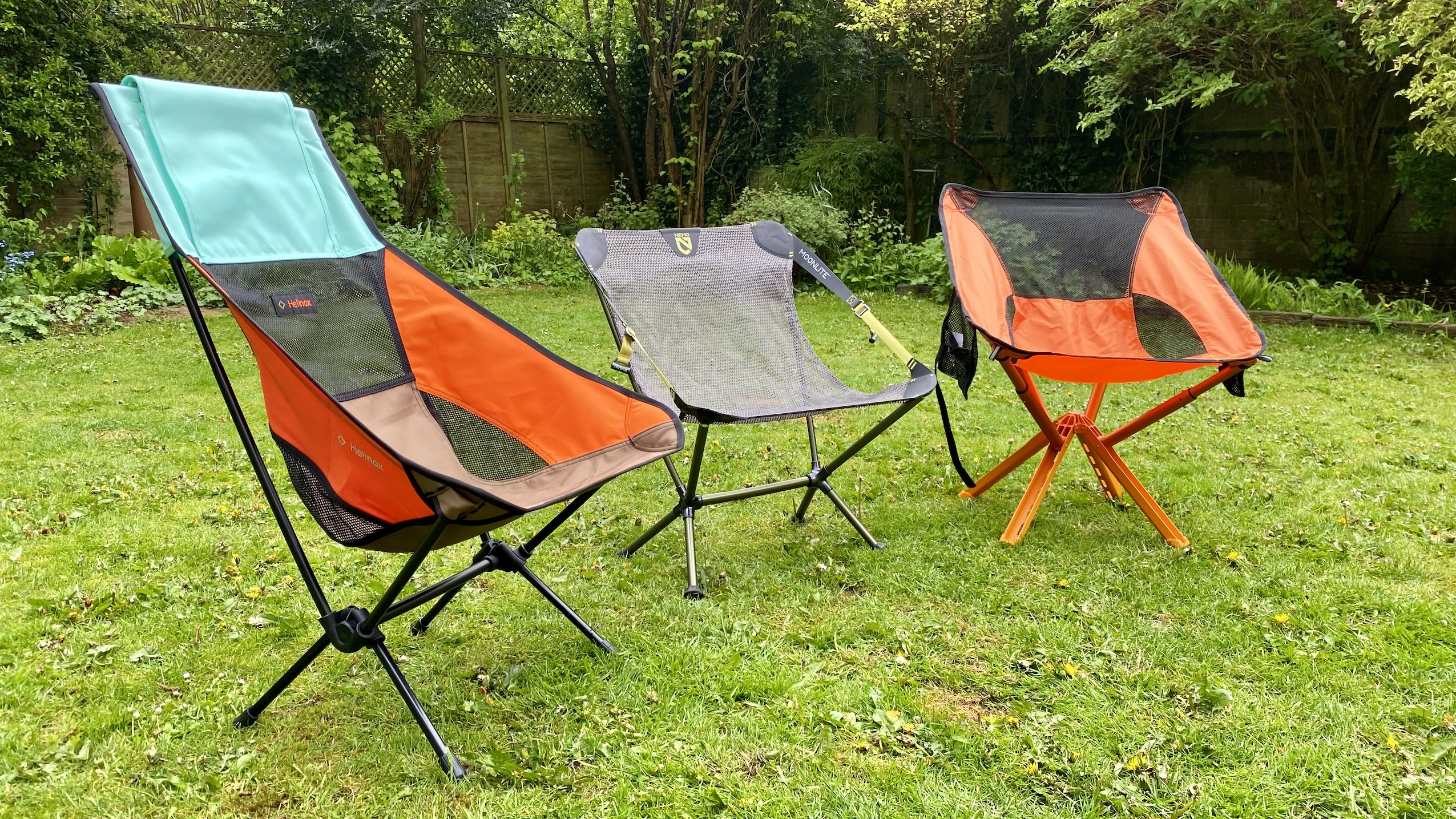
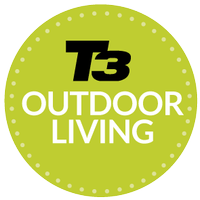
- What I don’t like about conventional camping chairs
- What’s so good about a lightweight backpacking camping chair?
- What’s not so good about a backpacking camping chair?
- Price and availability
- Design & features
- Assembly process
- Performance and stability
- Which lightweight camping chair is the most comfortable?
- Final verdict
- Alternative for taller and larger users
Helinox Chair Two vs. Nemo Moonlite vs. Sitpack Campster II: Which is the ultimate ultralight camping chair for your summer adventures?
Having already extolled the virtues of camping cots and self-inflating mattresses, my search for complete camping comfort has now extended to camping chairs. But not any old camping chairs.
Rather than focus on conventional camping chairs that are invariably heavy to carry and often too bulky to fit into an already overpacked car, for this three-way showdown, I called in a trio of ultralightweight chairs that collapse into tidy packages that take up hardly any room in a backpack and no room at all when transported in a car or caravan.
There is a very wide choice of backpacking chairs on the market but, like any self-respecting journalist on the lookout for the very best gear to write about, I alighted on the Helinox Chair Two with its relaxing high back, the adjustable Nemo Moonlite Reclining Chair and new kid on the block, the Sitpack Campster II.
All three of these featherlight chairs are perfect for backpacking, hiking, fishing, car camping, caravanning, festival going and spectator sports, and any of them would rate highly in our guide to the best camping chairs.
But which one’s the best model for you?
Helinox Chair Two vs Nemo Moonlite vs Sitpack Campster II
What I don’t like about conventional camping chairs
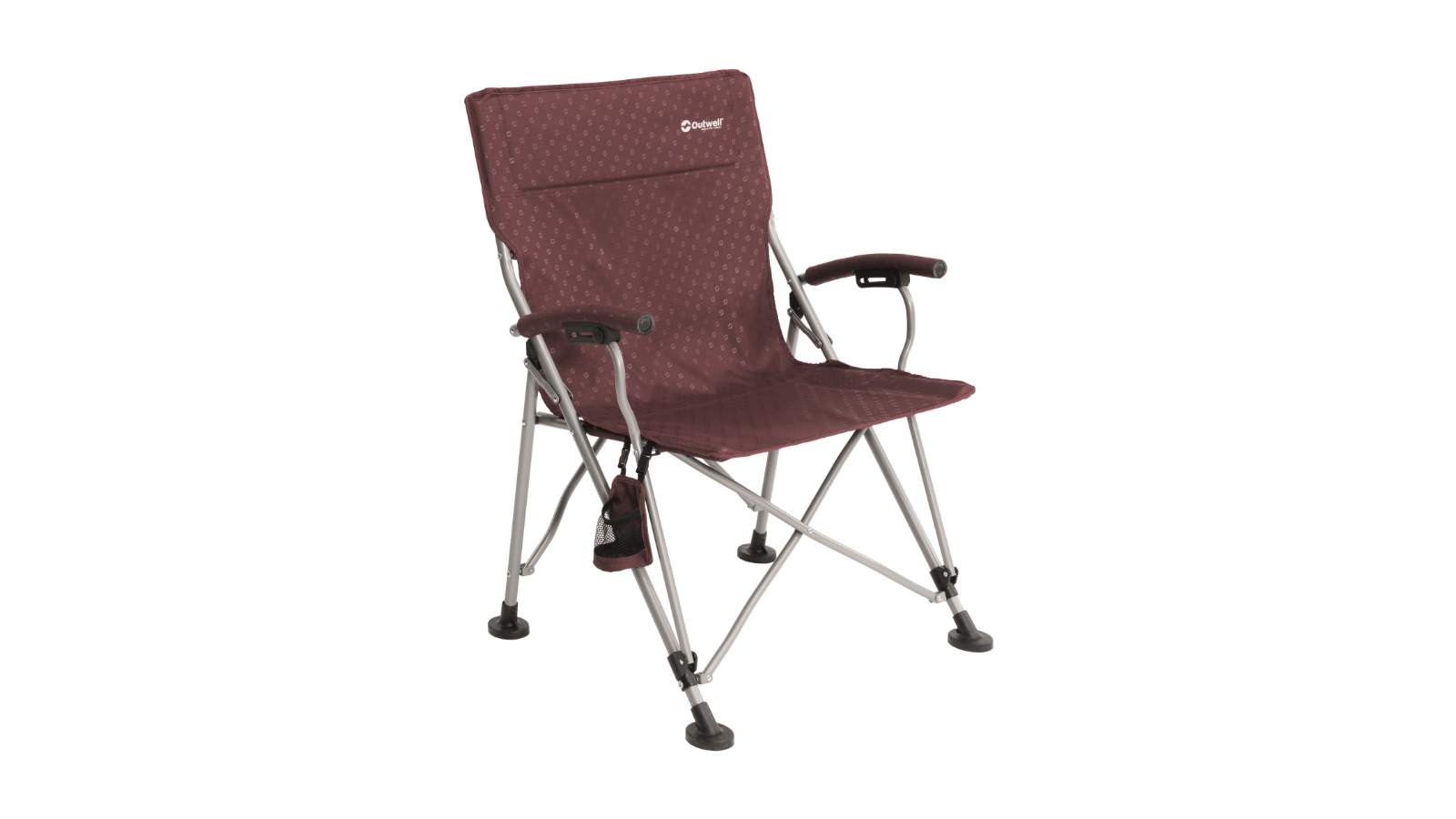
Here's a prime example of a conventional camping chair
One of the main problems with conventional camping chairs is weight and size when folded. If you take a cheap sub-£25 steel option with legs that collapse to form a single column (the most common style of chair), chances are it’ll weigh between 2kgs and a whopping 4kgs. And when collapsed you’re looking at packed dimensions of between 80cm and 100cm in height and up to around 20cm in width. You’d be surprised by how much space a single standard camping chair takes up in the car and you can forget about taking it on a backpacking trip.
Get all the latest news, reviews, deals and buying guides on gorgeous tech, home and active products from the T3 experts
Another thing I really dislike about conventional chairs is the way the taut front lip of the fabric and the overly narrow frame digs into your thighs, making it uncomfortable to sit in for long periods. This digging in is even worse if you try to sit with outstretched legs. Why most manufacturers can’t get a handle on this and provide a slightly wider frame at the thighs and a more supple front end with less stitching that provides more ‘give’ is a moot point, but in most cases I find these types of camping chair very uncomfortable to sit in, despite their clever folding mechanisms.
What’s so good about a lightweight backpacking camping chair?
The answer is threefold – weight, or rather lack of it, packed size and comfort. Let’s start with weight since that is of prime concern to backpackers. How does just under a kilo to just over a kilo sounds to you? That’s about a kilo less than the lightest conventional chair and you’ll come to appreciate that floaty weight when it’s on your back along with all your other camping gear.
Size, too, is a big winner when it comes to backpacking. Unlike their big brethren, collapsible backpacking camping chairs collapse into tidy packages that can be easily clipped to the outside of a backpack or stored in the tiniest of spaces in the car. Indeed, two models in this test are just 35x10cm when packed.
Compared to conventional folding models, backpacking chairs require a bit of assembly often using a pile of tent-style aluminium poles with shock chords attached for easier erection. However, this usually only takes a few minutes and, crucially, the models in this test require no brute force to assemble unlike, say, the model I once bought at Costco that took so much force to attach the seat pad to the frame that I gave up and threw it in the bin.
Once assembled, you’ll be amazed at how comfortable these chairs are to sit in, even for long periods. Many models sit low to the ground too – as low as 34cm – which prevents pinching around the thighs and allows users to stretch their legs without cutting off the blood supply. All the models in this comparison fit body shape to perfection while providing plenty of support and surprising rigidity given their spindly legs.
Since backpacking chairs are so light and portable, they are also brilliant for occasions other than camping, like picnics, fishing, music festivals, firework displays, sporting events on the village green or simply relaxing at home in the sunshine.
What’s not so good about a backpacking camping chair?
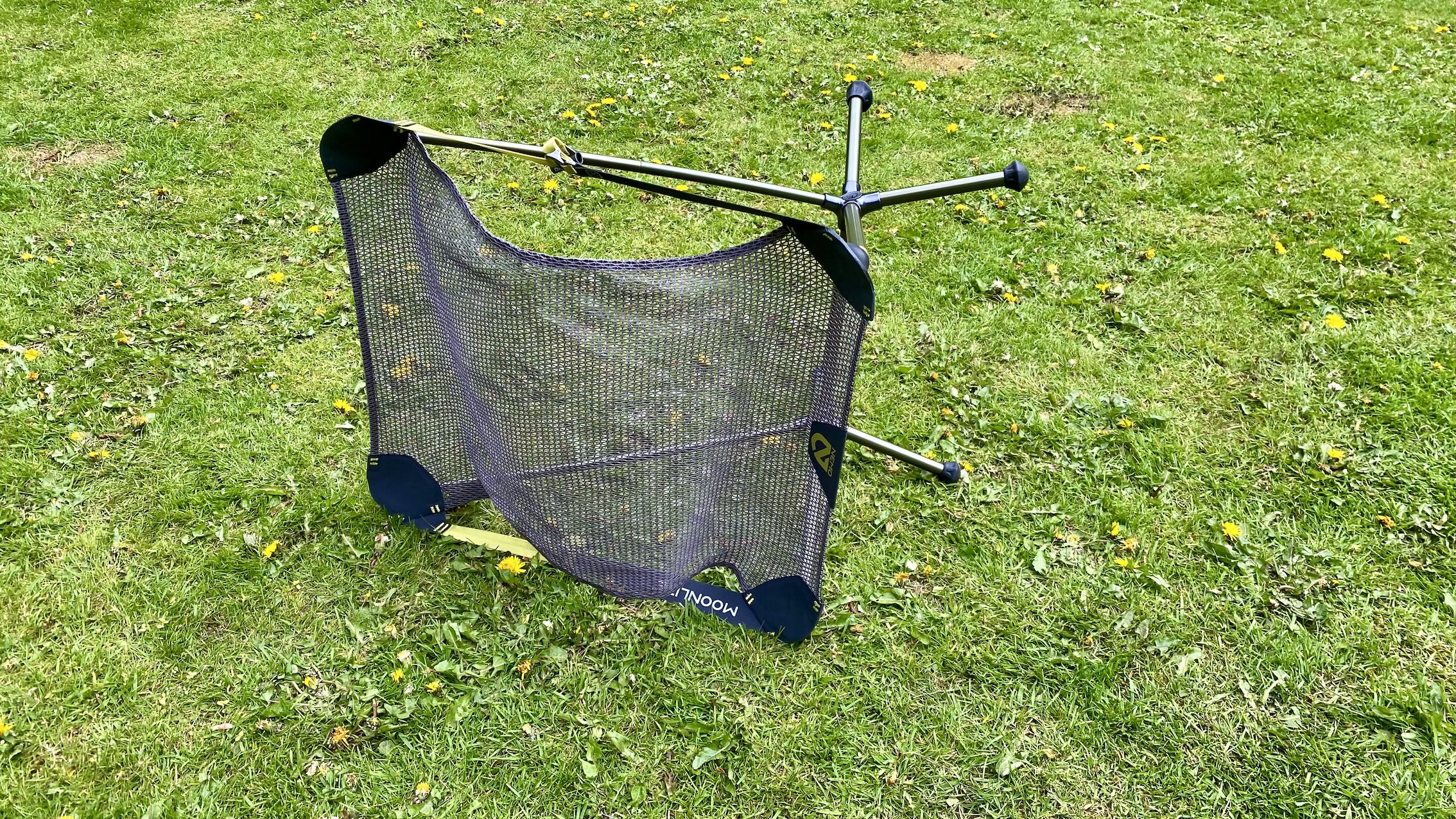
Watch out for wind or your chair may blow away
While backpacking chairs are light enough to pick up with a pinky finger, that lightness can also be a hindrance if there’s a lot of wind about. There are quite a few stories knocking around of campers coming back from a walk only to discover that their prized – and rather expensive – specialised camping chair has blown into a river or onto someone else’s pitch. One good way to alleviate this wind issue is to use a tent peg against each leg. Incidentally, Helinox sells a handy Chair Anchor (around £15) that attaches to their chairs’ horizontal struts.
Also be doubly careful if sitting by an open campfire because it takes just a second while you get up to make a cup of tea for a gust of wind to blow the chair into the flames. If this happens, the heat will burn a dirty great hole in the chair’s nylon/polyester material in a single second and that will be that. Game over.
Most backpacking camping chairs are designed for summer use so many of them are clad in thin polyester, mesh or ripstop nylon that’s often ventilated around the sides and sometimes the back. This system wicks away perspiration when sitting in them after a long hike in hot temperatures. However, when the sun sets and temperatures start to drop, that extra ventilation can mean your back and sides get chilly so perhaps have a small fleece to hand which will not only add warmth but extra comfort in the process. Incidentally, Helinox produces seat warmers designed to fit some of their individual chairs while the Sitpack on test came with the company’s optional quilted seat cover.
Given the amount of pressure on the rubber feet of backpacking chairs, there are times when a chair leg or two might sink into the ground, especially when on a sandy beach. Thankfully some manufacturers like Helinox and Sitpack sell optional ground sheets that attach to each leg stopper. They do a very decent job of stopping the chair from sinking.
Since most high-quality backpacker chairs are expensive to buy, they may be very attractive to light-fingered folk – it happens. Granted, theft of a chair is extremely unlikely but if you’re worried about your new possession, perhaps consider popping it inside the tent when you leave the campsite.
Price and availability
In the UK, the Helinox Chair Two retails at around £130 and is available direct from Helinox who have a sterling postage service, Ellis Brigham, Wild Bounds and Amazon.
If you prefer the Nemo Moonlite which costs around £160, try Cotswold Outdoor, Snow+Rock, Amazon or Absolute Snow, where it’s selling for a smidge under £147.
The Sitpack Campster II is only available direct from Sitpack, priced at £90.
If you live in the USA, you’ll find the Helinox Chair Two at Helinox priced $139.95 plus Amazon and CampSaver for the same price.
The Nemo Moonlite is also readily available in the US priced at $179.95. You can buy it at Amazon, CampSaver and BlackOvis where it’s shifting for $159.95.
If you fancy the Sitpack Campster II, head to Sitpack ($110)
Design & features
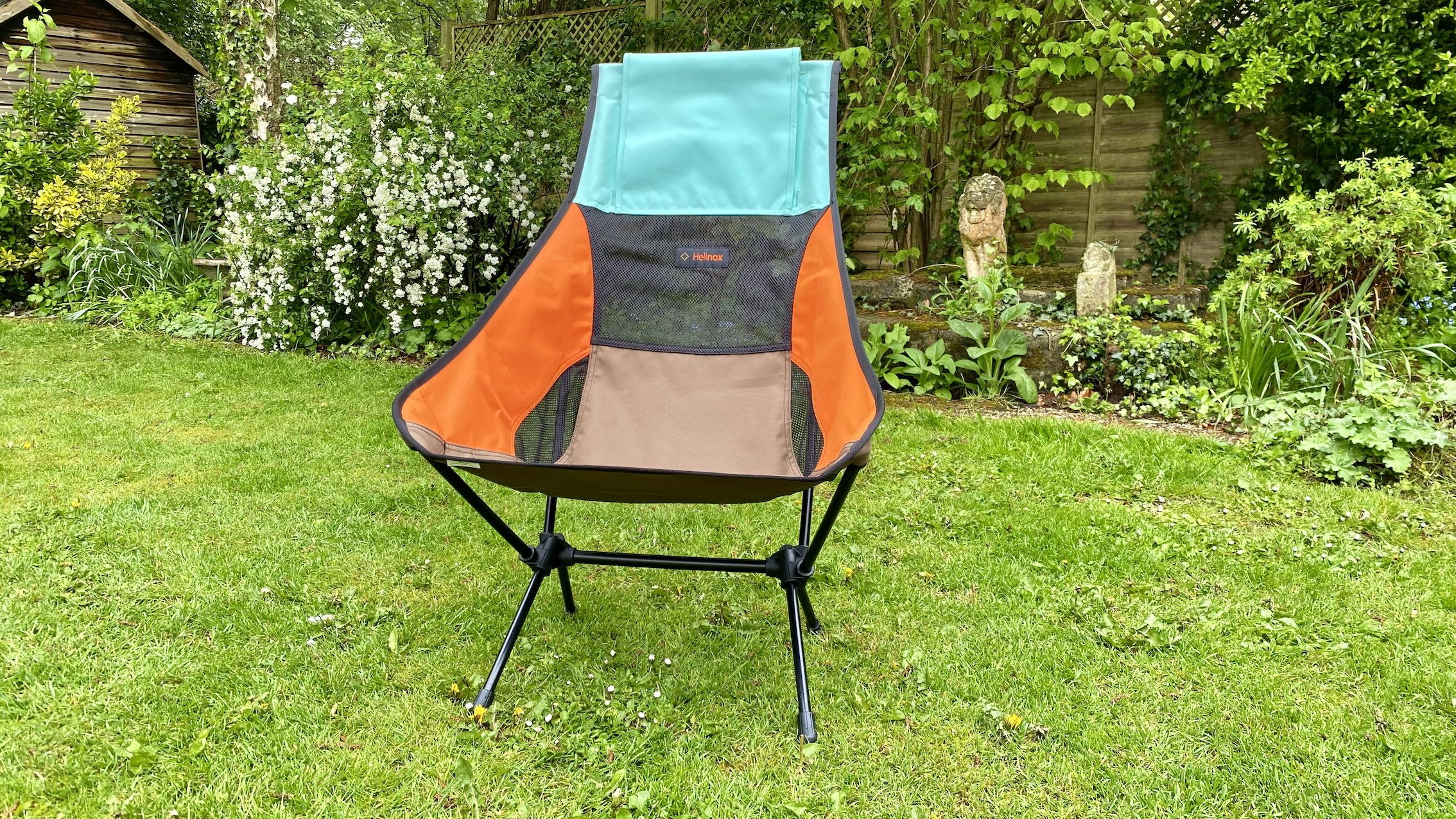
Helinox Chair Two
Let’s start with the Helinox Chair Two which is available in a smorgasbord of colours, including the gorgeous beach-like Mint Multi Block variant we have here. If you want the highest level of engineering and materials, look no further than this prestigious brand. The Chair Two sits about 30cm off the ground so it’s the lowest on test. While being lower down means that you will be looking up at any fellow campers sitting in conventional chairs, the plus side is less pressure on the back of the legs, especially when stretching out in chill mode. Moreover, because this chair has a high-back design you can genuinely catch several winks in it, especially if you tuck a towel or small jumper into the velcro’d head flap. However, there are no cupholders on this chair so you’ll just have to put your beer on the ground with the ants – but, hey, you at least won’t have to reach down for it.
As to be expected from Helinox, build quality is exemplary. From the strength and robustness of its 600D polyester seat cover, the industrial-strength stitching and mesh insert for added ventilation to the slim but strong proprietary DAC aluminium alloy frame and nylon resin hubs, this model screams quality.
At 1,121g, the Chair Two is just 165g more than the Nemo Moonlite and that’s pretty insignificant given the extra headroom it provides. With a height of 84cm, width of 54.5cm and 64cm in depth, this model is a great one-size-fits-all option though taller and more rotund users may prefer the much larger Helinox Savannah model we look at towards the bottom of this article.
If I were to purchase any accessories for this chair it would be a set of Vibram Ball Feet because the leg stoppers on the Chair Two are very slim and they do tend to sink into soft ground. A set of aftermarket ball feet solves this issue in a thrice.
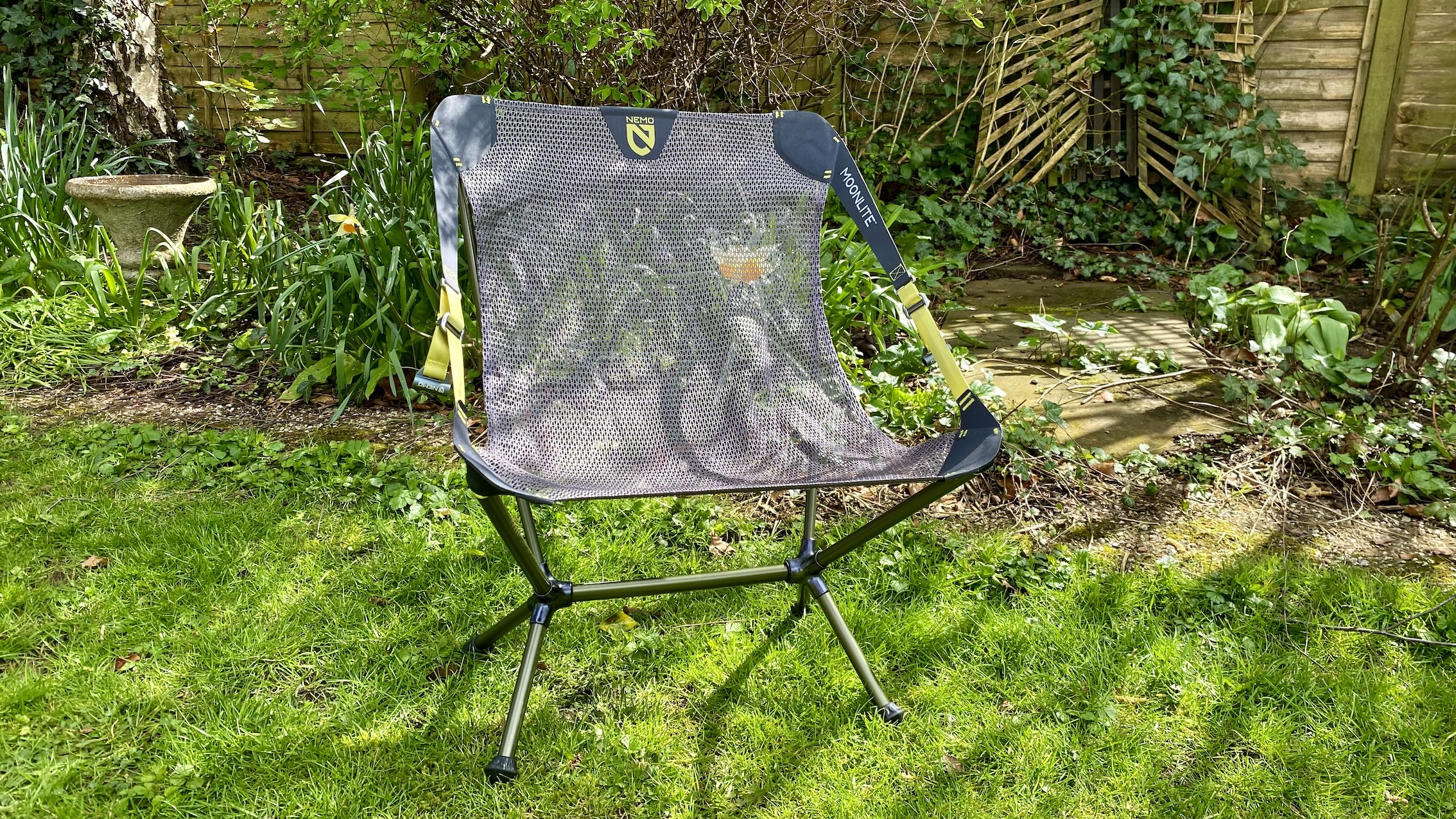
Nemo Moonlite Reclining Chair
While the Nemo Moonlite doesn’t have a head support like the Helinox, its clever adjustable side straps means it can be reclined by several inches (when in upright mode, simply tug on both arm straps at the same time and the rear will move back 10cm). However, you will need to get off to retighten the straps so it can be returned to an upright position. This adjustable seating position is a very cool feature that you will find genuinely useful.
The Nemo uses light, oversized 7001 aluminium poles connected to each other by elasticated shock cords. Both the poles and forged 6061 aluminium connection hubs on the frame are of the highest quality and look like they’d last for years. The feet, too, are large and splayed out to prevent sinking into soft ground. For the seating area, Nemo has used a ‘custom-engineered mesh’ and it’s both extraordinarily breathable and amazingly stretchy which helps make it feel really comfortable, but more on that below. However, you don’t get any cupholders with this chair.
At just 956g, the Nemo Moonlite is the lightest model here and the smallest to both sit on and pack away. In fact, at just 34cm off the ground, the Nemo is one of the lowest standing chairs here. Although this makes it a top choice for users of slightly smaller stature and children, I believe it’s still suitable for most larger users. When packed, this dinky model chips in at 35cm x 10cm – and it doesn’t get more practical than that. The Nemo Moonlite is available in three colours – the Black Pearl variant we received along with pale Blue Horizon and orangey Mango.
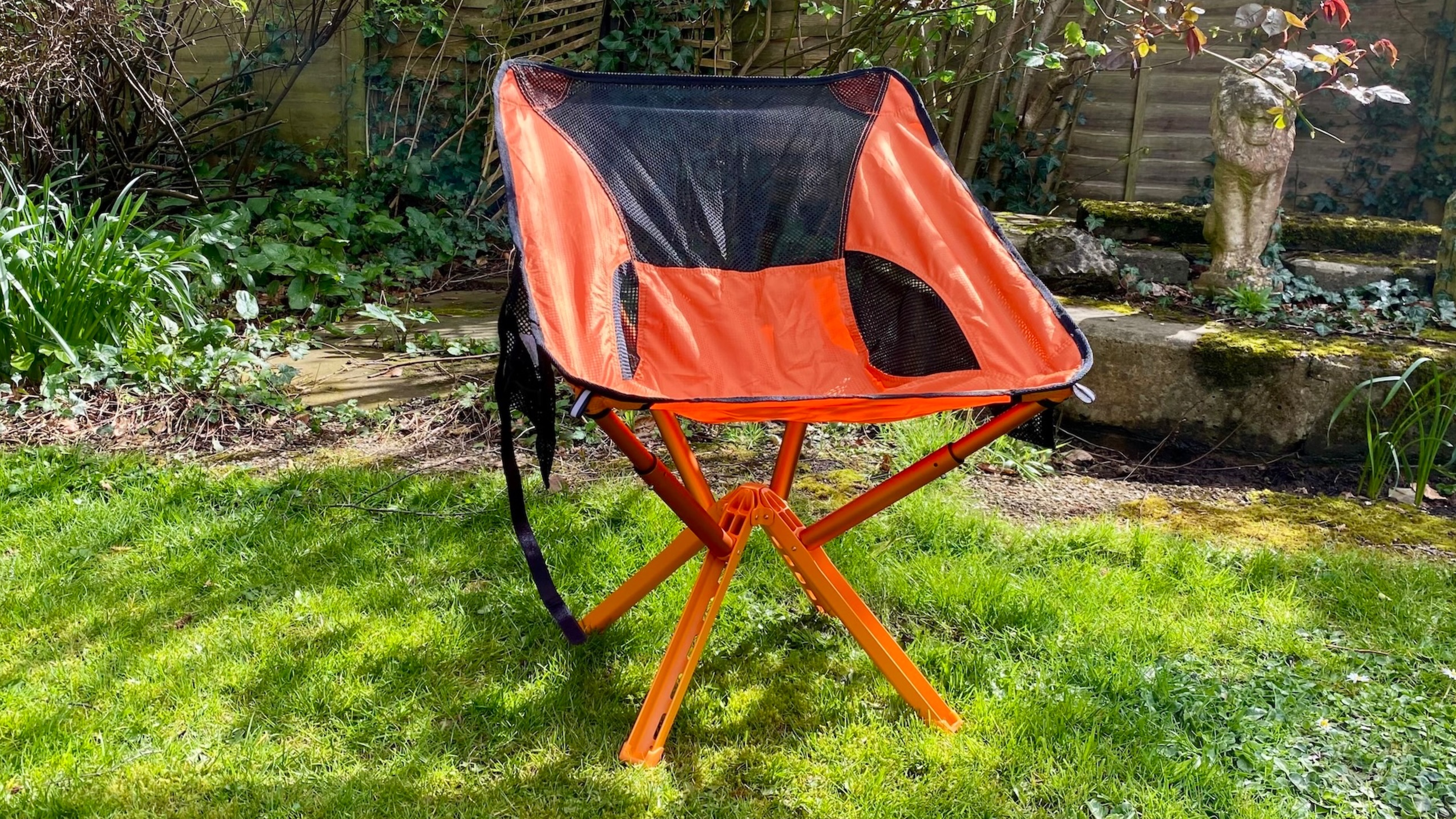
Sitpack Campster II
Available in black or deep orange, the Kickstarter-funded Campster Sitpack II takes a completely different approach to assembly since its moulded aircraft-grade aluminium legs are already attached to the frame and seating fabric. However, a consequence of this innovative all-in-one design is that the Sitpack II weighs more than both the Helinox and Nemo – 1,460g to be precise – and you do notice this extra weight when you pick up each chair in turn. Nevertheless, I don’t think the extra weight would be much of a hindrance to the average backpacker because the collapsed package (38cm x 8cm) is only a smidge larger than the Nemo Moonlite.
The Sitpack II uses Oxford 600D Ripstop nylon for the seat section which is what most kites are made from. Consequently, it’s very difficult to rip and that should ensure long-term durability. However I was not so enamoured of the removable soft-rubber feet it comes with, mostly because they kept falling off every time I moved the chair. There’s a very good chance you will leave one of these feet behind when you pack up camp, which is probably why the chair is shipped with two sets of feet – orange and glow-in-the-dark silicone. On the plus side, the Sitpack II comes with phone-sized mesh storage pouches on either side.
Assembly process
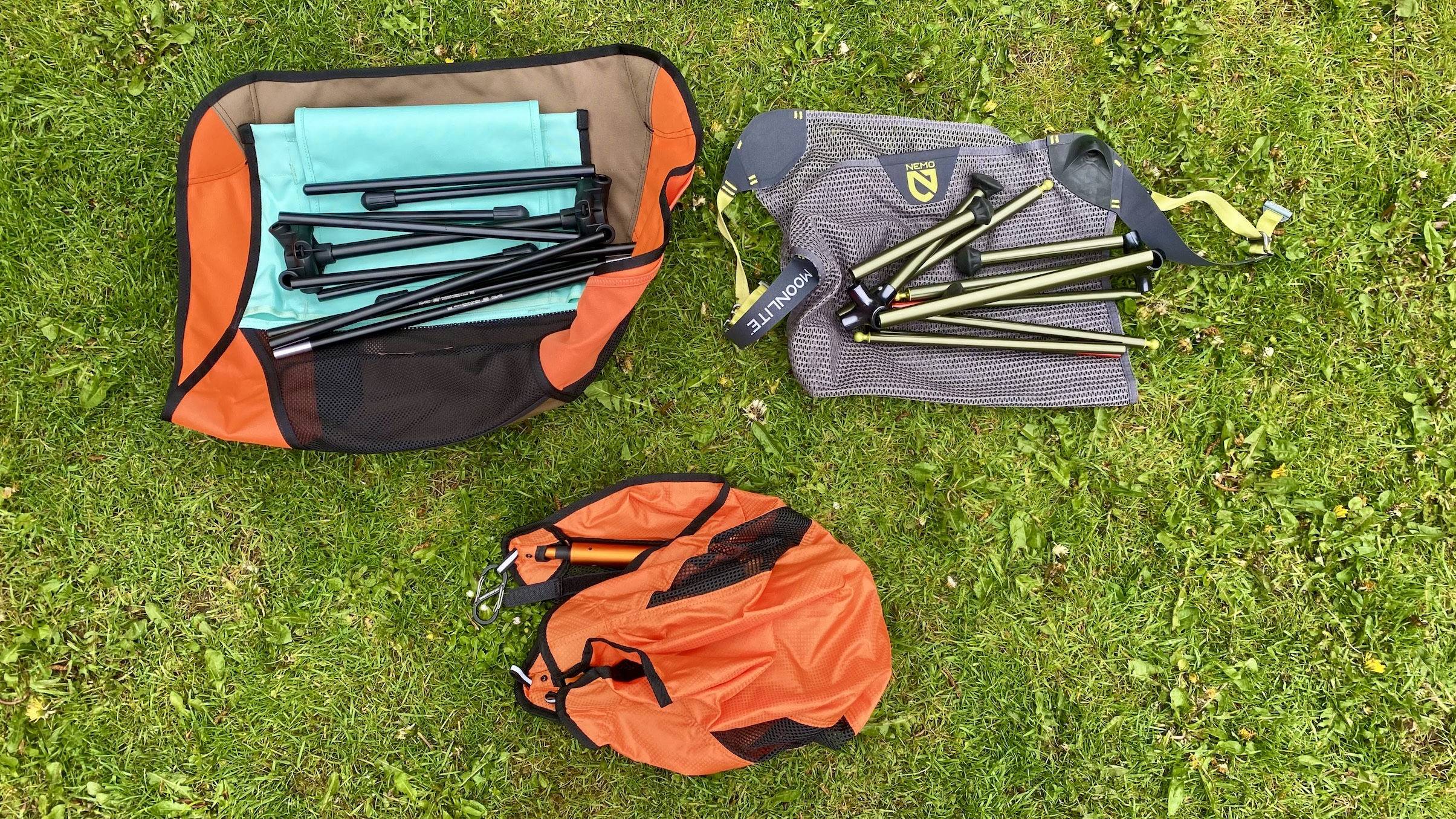
From left clockwise: Helinox Chair Two, Nemo Moonlite and Sitpack Campster II
Like most floaty backpacking chairs of this nature, the Helinox Chair Two requires assembly by fitting together a pile of aluminium tubes, but thankfully the system is fool proof because every tube is connected by an elastic shock cord so it’s impossible to go wrong. Once the frame is in place, it takes just 15 seconds to slide the head section of the seat pad over the two upright poles and attach the two front corners. Simples.
The Nemo Moonlite was just as quick to assemble – in fact it took me less than a minute. I simply joined the legs together, grabbed the mesh seat section and attached the sockets on each corner to the ball joints on each end of the frame. A gentle push was all that was required to locate each corner. However, disassembly was a lot trickier and it took a lot of effort to free the ball ends from the frame sockets. Strong hands are most definitely required for this part of the process.
As mentioned above the Campster Sitpack II is an all-in-one chair replete with moulded aircraft-grade aluminium legs that are already attached to the frame. All you have to do to erect the chair is unfold the legs into a star shape and extend all four frame sections until they click into place. It’s a very clever solution that works exceedingly well once you’ve got the hang of it. In fact it took about 30 seconds from taking it out of the bag to sitting on it.
Performance and stability
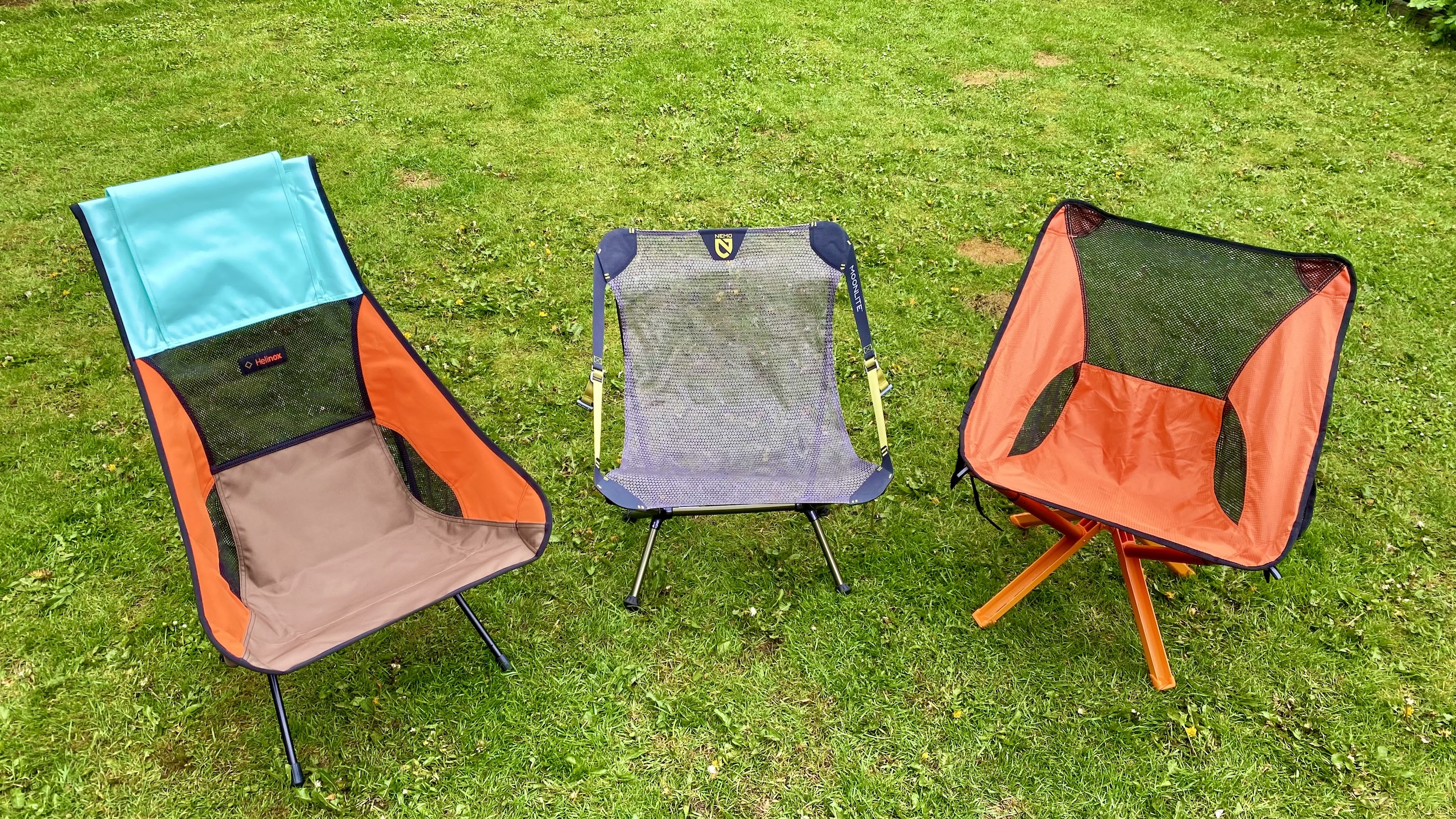
From left: Helinox Chair Two, Nemo Moonlite and Sitpack Campster II
All three of these chairs performed incredibly well at supporting body weight without too much flexing. Yes, these chairs do flex a little and one should be wary of leaning back too far when having a stretch or there’s a chance you’ll go over backwards.
If there are any downsides with backpacking chairs, it’s that their low height can make them quite tricky to get in and out of, especially if you’re not as steady on your feet as you once were. That said, some models are easier than others.
Take the Helinox Chair Two. Despite its low height, I found this chair very easy to get in and out of. Granted, it flexes a bit from side to side but everything is so well put together there is never a sense that it might buckle under pressure. And anyway, I actually like a bit of flexibility as it adds a modicum of rocking chair comfort. The Helinox Chair Two has an impressive user weight capacity of 145kg.
Although the Nemo Moonlite is really low to the ground (34cm) I found it okay to get in and out of. I just held both straps on the sides of the chair and lowered the posterior. I did much the same thing to get out of it, too.
The Moonlite has a little side-to-side flexibility and a bit more corner-to-corner movement but nothing that gives the impression that it’s about to collapse. There is also a bit rocking fore and aft. However, this chair’s leg assembly is very short so I would be careful of leaning back too much or your embarrassing blunder might end up as a viral TikTok clip. The Nemo Moonlite has a maximum weight limit of 136kgs.
When it comes to flexibility, the Sitpack Campster II feels the most solid of the three. There’s simply very little movement in the legs but then its leg construction is different from the norm. Instead of round tubular legs like most camping chairs of this nature, the Campster II uses an aircraft-style aluminium frame that’s marginally over one inch in thickness. This gives the chair excellent rigidity with hardly any side-to-side or fore-to-aft movement – but at the expense of extra weight. Mind, like the Nemo, it would be pretty easy to tip over backwards if you leaned back too much. The Campster II’s rigidity also helped make it easy enough to get in and out of, despite its seat being only 39cm off the ground. Like the Nemo, this chair also has a max weight limit of 136kgs.
Which lightweight camping chair is the most comfortable?
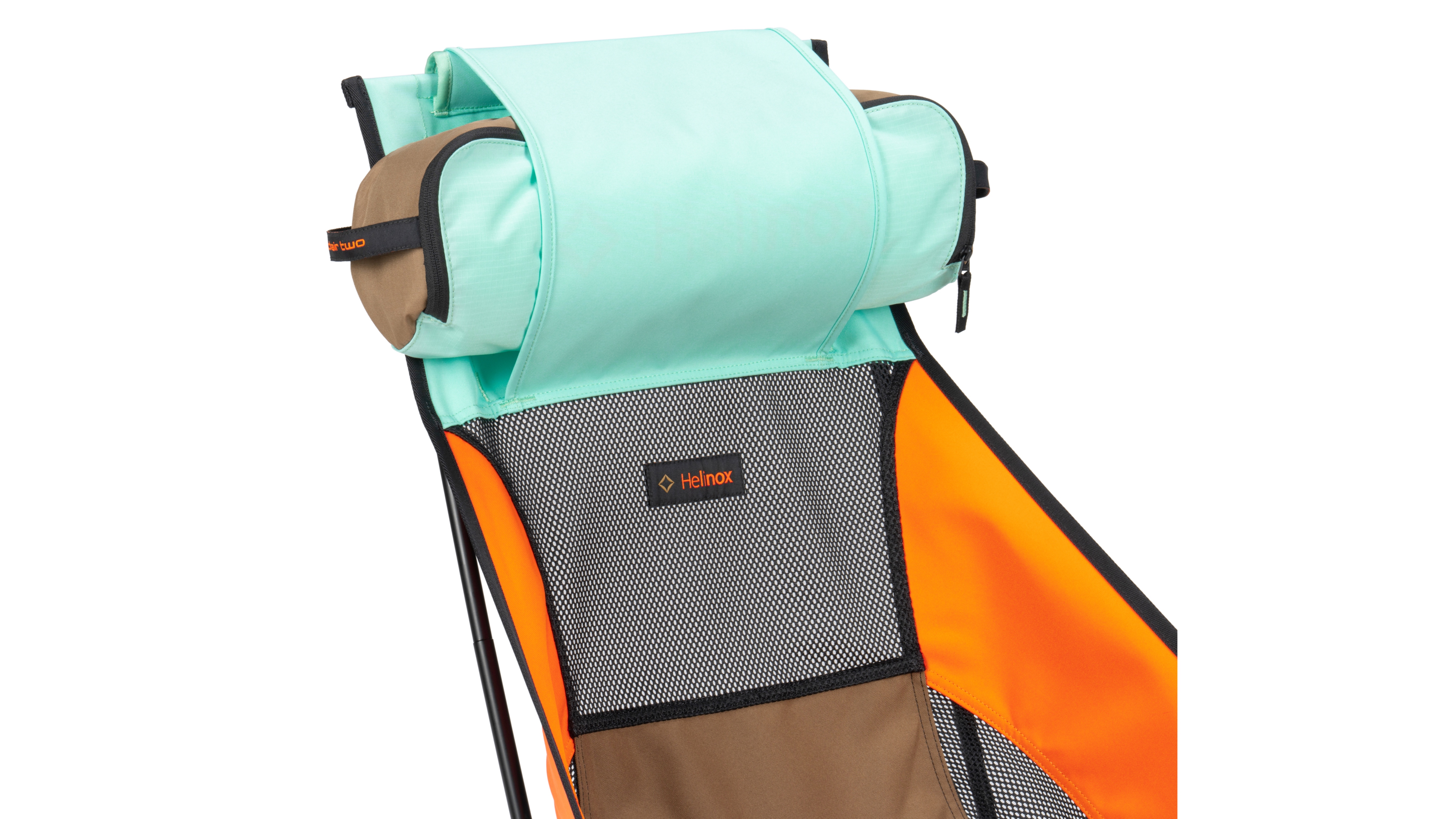
Helinox Chair Two wins for outright lazy comfort
The Helinox Chair Two gets top marks for comfort. Both myself and my partner loved the extra height of this chair which allowed us to lean back and have a good snooze. Although the back of my head rested against the top of the frame, it never felt uncomfortable. Plus I had the option to stuff a rolled-up jumper inside the carry bag for added neck support. This is a great chair for unwinding in though you might need to adjust your seating position if eating food off a plate since it encourages a more relaxed, leaned-back posture. But, crucially, there’s hardly any pressure on the back of the thighs and that’s a key thing for me. Width wise, this chair was perfect for my body size and my partner’s, too, though the larger Helinox Savannah model I write about below might be a better bet for larger users.
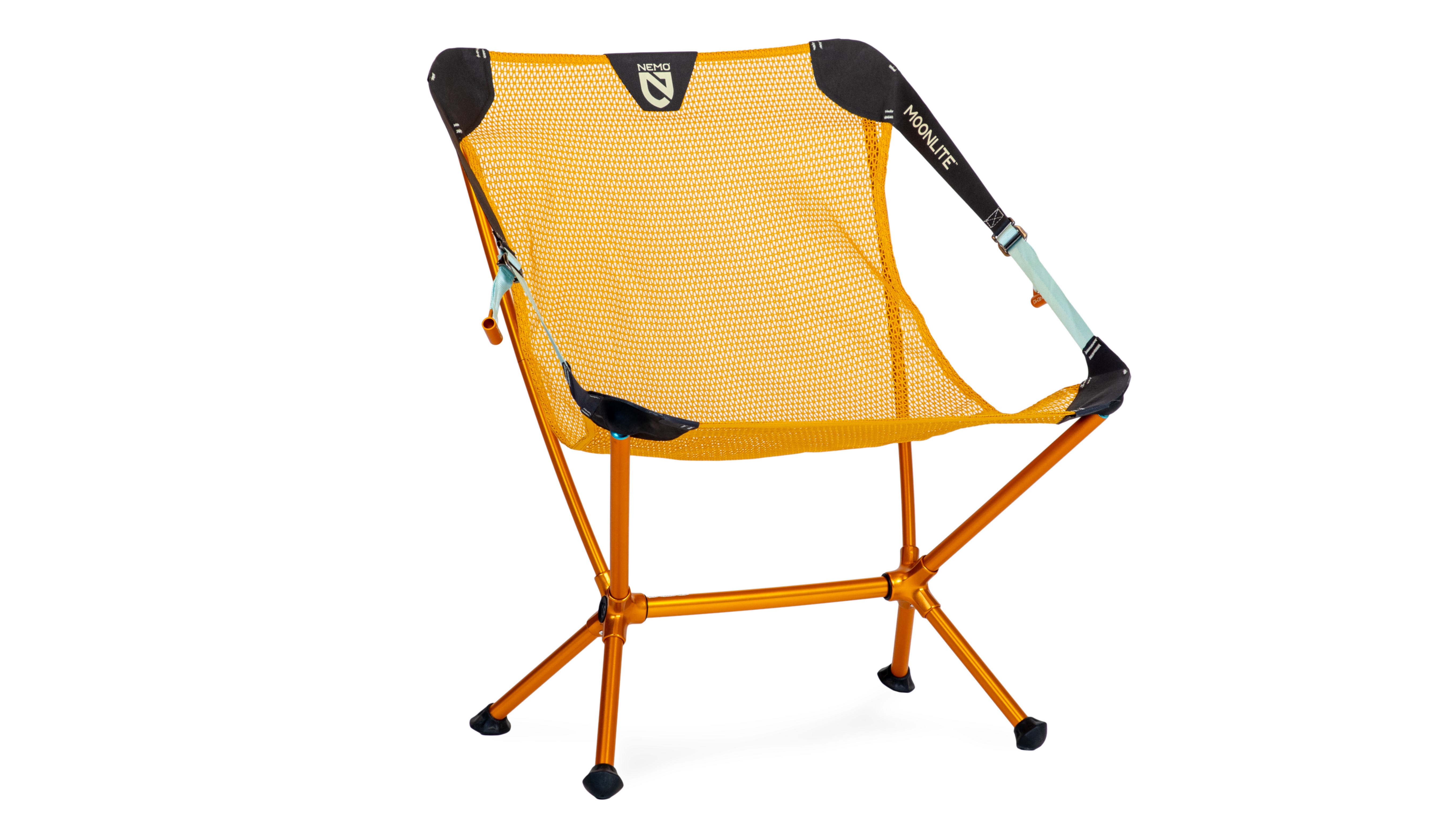
The Nemo Moonlight feels like a bucket seat and is comfy to boot
At just 65cm in height from floor to top of chair, the Nemo Moonlite almost looks too small for an adult but, against all odds, it fit my 5’6” frame to perfection with just the right amount of space along its 51cm width. I loved the stretchiness of the mesh that perfectly moulded to my figure while providing great support.
You sit so low to the floor in this chair that it feels like a bucket seat in a racing car. However, this low height also ensures that there isn’t any pressure on the back of the thighs because your knees are pointing upwards. Nevertheless, I did experience some pressure on the back of the thighs when stretching the legs but it was nothing like as bad as sitting on a standard camp chair.
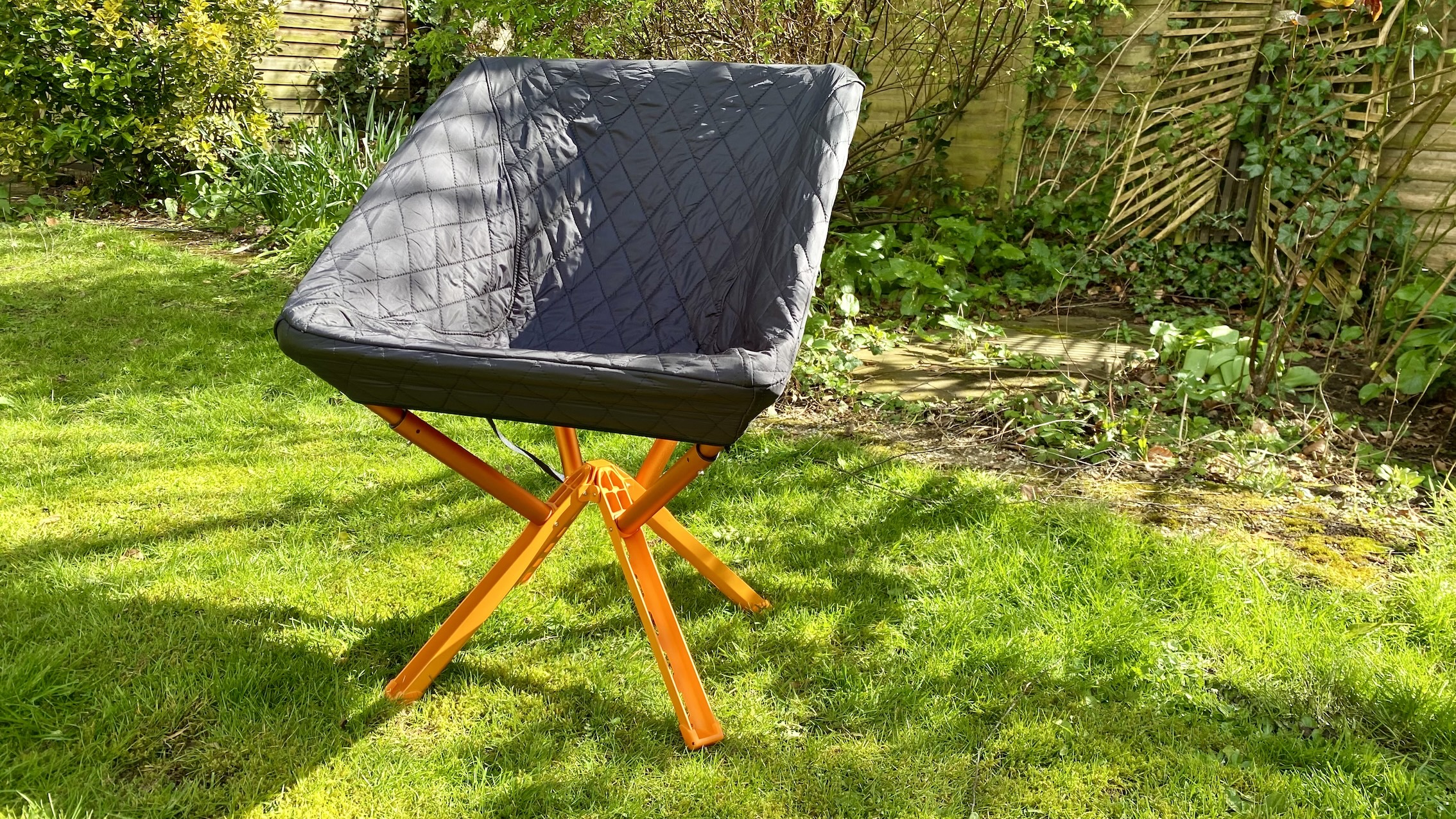
The Sitpack Campster II with optional quilted cover for extra warmth
If I was in a blindfold test, I’d say that the Sitpack Campster II just swings it for outright comfort. That’s the opinion of both myself and my partner. This chair just felt so right to me, with an amazing fit around the posterior. When moving from one chair to the other, the Campster II felt instantly that little bit more comfortable – but only by a smidge. I was also able to sit with outstretched legs with almost zero pressure on the rear of the thighs. By the way, I also tried the Campster II with the company’s very tight-fitting optional quilted fleece liner and I recommend this upgrade if you feel a bit chilly come nightfall.
Final verdict
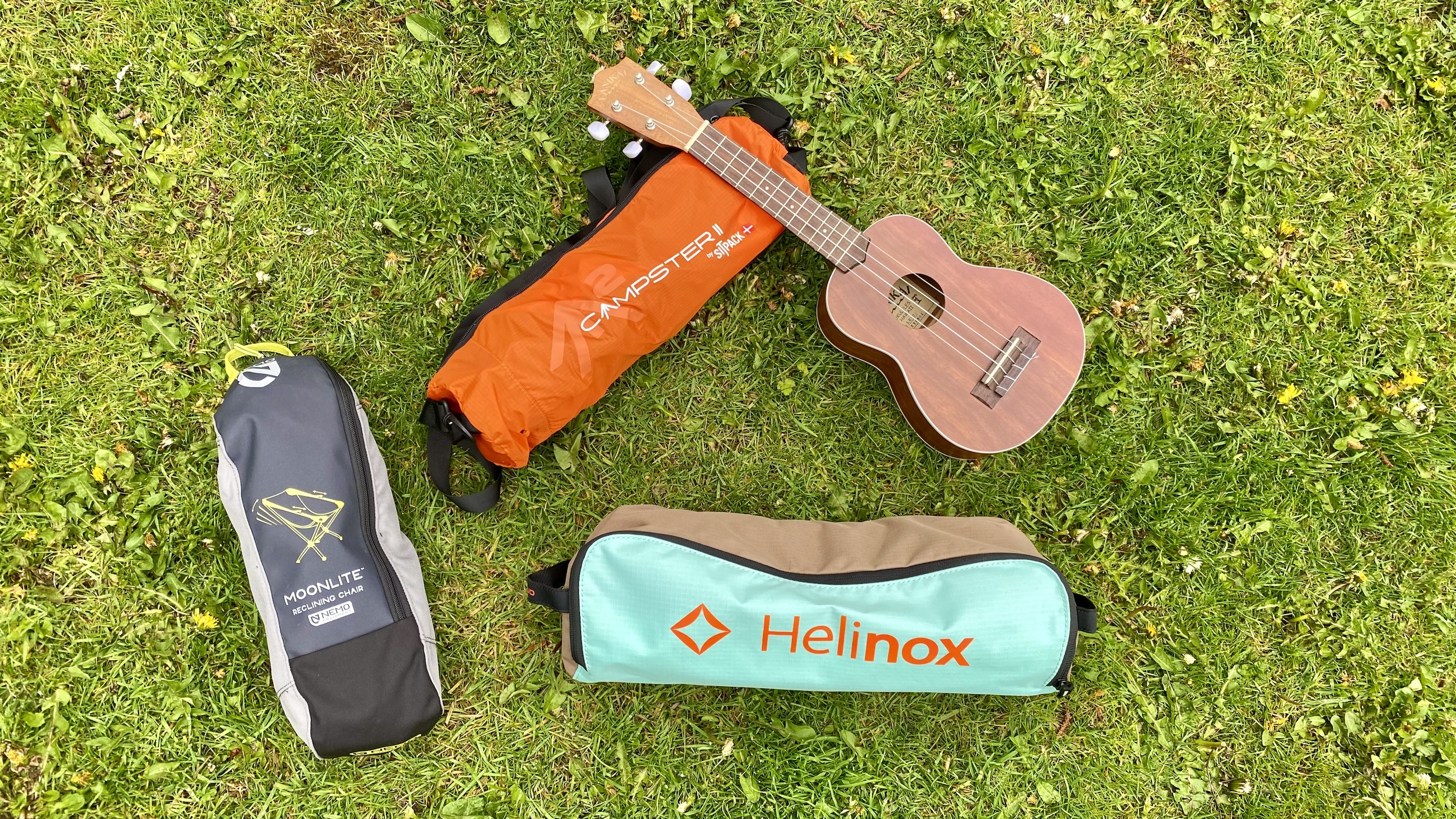
All three camping chairs with ukulele for scale
This is the tricky part because all three chairs have been amazingly comfortable and I’ve found myself flitting from one to the other repeatedly. Nevertheless, here are my final thoughts on each chair’s build quality, portability, comfort level and, of course, price.
1) The Helinox Chair Two retails at £130 and I consider that a perfectly acceptable sum given the convenience of having a premium-quality high-back chair that fits like a glove and let’s you relax a little more, is light enough to carry long distances and small enough when packed for any medium-sized weekend backpack. This would be my number one choice for a weekend camping trip or a day on the beach.
2) There’s no denying the comfort the keenly-priced Sitpack Campster II (£90) provides and it was a doddle to assemble and just as easy to fold away. However, despite its titchy size when packed, its extra weight could be a hindrance for most lithe backpackers. Nevertheless, the Campster II was arguably the most comfortable in this three-way tussle and I would have no issues recommending it, especially for car camping and festival going. I just wish those bloody rubber feet didn’t keep falling off.
3) At a whopping £160, the Nemo is the most expensive model in this three-way bash. However, it’s superbly designed to recline with ease, is ultra light and eminently portable. It was also very easy to build but very tricky to disassemble. Aside from camping, this is probably the chair I’d take to a festival, picnic or sports event, partly because it’s so light and insignificantly small.
I hasten to add that Nemo also manufactures two other chairs, including the T3 Platinum Award-winning Stargaze while Helinox produces an even bigger range of chairs in a wide variety of shapes and sizes. So, if none of the models on this page tickle your fancy, there are plenty of other options available.
Which brings me to just one more thing…
A brilliant alternative for taller and larger users
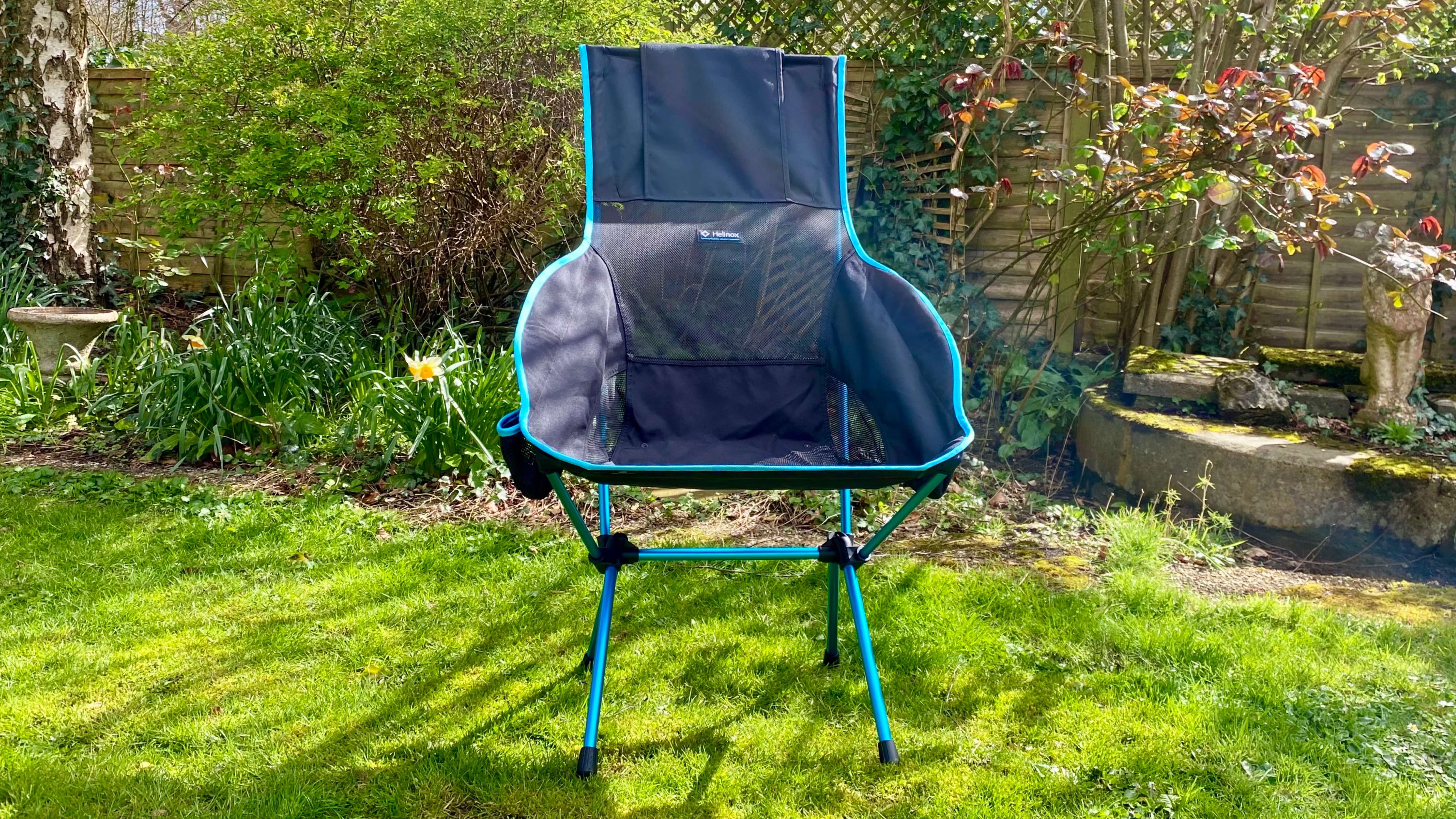
The Helinox Savannah is a superb fit for larger and taller users
If you’re of larger build and in the region of six feet in height, the Helinox Savannah (£200) is the best option for you since it has a really tall back for full relaxation – so tall that my head only just touched the base of the velcro cushion holder. It is also a substantial 64cm in width so there’s plenty of space around the posterior. This chair was definitely the easiest to get in and out of mostly because it sits quite a bit higher than the other three chairs on this page. In fact, it’s closest to the seat height of a standard heavyweight folding chair.
Like the Helinox Chair Two above, the Savannah’s frame is comprised of rigid DAC aluminium alloy though its struts are much wider than the Chair Two’s and this makes it feel much less flexible – a good thing given its 145kg capacity. As is the norm, the Savannah’s 600D polyester seating fabric provides incredible support and I don’t think it would be possible to damage it in any way other than an altercation with a camp fire.
Comfort wise, this one feels like a proper armchair – in fact it actually has arms on it in the form of flexible wings that do a great job of supporting the elbows. The seat area has loads of space to move around in, too, and there’s no denying the added comfort value of being able to lie back and actually fall asleep. It also has a cup holder on the side. Just be mindful that when the pillow section has cushioning in it, the chair becomes quite back heavy so there’s a good chance of it falling over.
At 1,832g, the Helinox Savannah may be a bit too weighty and large to haul around for some backpackers but, by jove, it’s so darn comfortable that the extra weight is arguably worth the hassle.
Derek (aka Delbert, Delvis, Delphinium, Delboy etc) specialises in home and outdoor wares, from coffee machines, white appliances and vacs to drones, garden gear and BBQs. He has been writing for more years than anyone can remember, starting at the legendary Time Out magazine – the original, London version – on a typewriter! He now writes for T3 between playing drums with his bandmates in Red Box (redboxmusic).
